Damian Cotter is currently working in the NBA G-league with the Long Island Nets after forging a highly successful career in Australia. A former Australian junior team head coach, Cotter was an assistant coach of the Opals at the Rio Olympics in 2016.
Regarded as a leading player development coach, he was Director of Coaching at Knox Basketball Association prior to taking the role of head coach of the NSW Institute of Sport Program.
Thoughts on Skill Development
The first question that comes to mind when developing a philosophy of skill development is to ask yourself what does skill development mean? And what would success look like? There are so many different philosophies and so much access to information on social media nowadays that there is a danger for a coach to get distracted and lose their way without establishing a philosophy.
Developing a philosophy and ‘disciplines of detail’ within your workouts is going to enhance your productivity as a coach and more importantly, give your player(s) the best opportunity to succeed in both the short and long term. Success is defined as whatever the aspect of the player’s game you are focussing on developing, and it becomes a conditioned response in competition.
In regards to workout disciplines, the basics must be continually nourished. Successful development coaches consistently work at simple drills at a high standard. The basics of basketball: shooting, passing, dribbling and footwork. Looking at sports like martial arts you will see the novice white belts and the more seasoned black belts working side-by-side on the basics early in the practice session. The basics are the most perishable. Ask yourself what basic skills you are good at developing, and develop your teaching skills om the areas you are not so competent at. Most of the time these basics are covered off in the warm-up portion of the workout. Even though it’s a warm-up, the repetitions must be of good quality and have a high level of focus. If warm-ups are loose then this will permeate onto sloppy execution in performance at games.
Some questions to ask yourself when setting out on establishing a philosophy on player development:
- How do I want to help the player?
- How many players is ideal in a development workout?
- Components of a good session?
- What is the optimal time/intensity for a workout?
- Shooting Philosophy?
How do I want to help the player?
The first thing to do is to establish where the player will be successful at their full potential, in both the short and long-term. This is largely driven by the actual player because they are the major stakeholder, not anyone else. Engage with the player in discussion(s) to establishing realistic long-term goals. This is the most important and challenging part of the process as it sets a destination for both you and the player to focus towards and most often the player has to make a positional shift to become a good adult player.
The basics are the most perishable.
Secondly, try to identify an aspect of the player’s game that we can improve on quickly as this will develop confidence in the short-term and help your professional relationship with the player moving forward. This is more of a pragmatic decision that relates directly to the player’s strengths, something that will have an immediate impact on the player’s performance; such as refining an already successful post move with a counter, or perhaps the development of a shot that the player shoots often within the offensive structure of their team. It’s also paramount that your player is aware of their own strengths and you both keep cultivating these strengths ongoing. Keeping a balance between the short and long-term focus will help the player maintain a positive and motivated attitude throughout their playing career. If this is achieved, you have been very successful as a coach.
Lastly, the higher level the player is, the more specific the workout design should be. Professionals should shoot game shots during the season and in the off season they may look to develop something new. Younger players will generally require a more generic workout.
How many players is ideal in a development workout?
When structuring a development workout, you must keep in mind what is optimal for the number of players you have for the session. If you have 1-2 athletes, you can work primarily on positional development. If it’s a group of 2-4 athletes, you may be able to incorporate some 1-on-1 or specific concepts such as feeding the post or pick-and-roll play. If you have more than 3 or 4 athletes, this may become more of a team practice and less of a development workout.
Once again, this must fit with your short and long-term plan for your player(s) development. Keep in mind that players nowadays do not engage in ‘no money fun’ anymore, and if you have an opportunity to provide competition within your workout this will be of great benefit. Giving players the opportunities within your workout to play through mistakes and compete helps short and long-term growth. This is where your coaching creativity kicks in – developing games to teach understanding and execution under pressure.
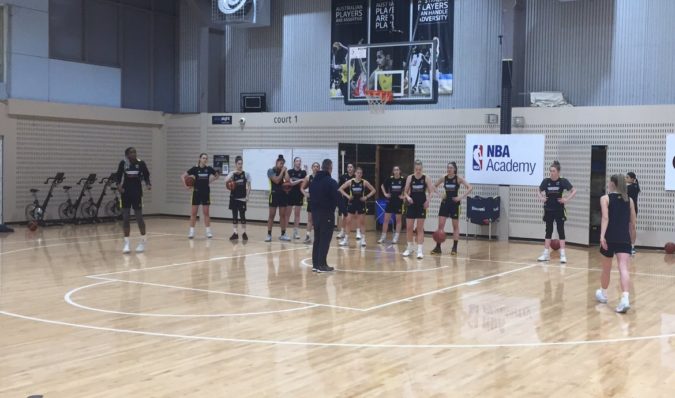
Components of a good session?
This is part of you developing you own philosophy, to have some workout disciplines that you adhere to. Below is an example of a 1-2 player workout of about 1 hour and the components that may be covered. It would be impossible to cover everything at high quality so try to cover off 3-5 (most of the time there is overlap within these components) of the following components with examples:
- Basics – Shooting, passing, dribbling, footwork
- Defence – Closeouts, slides, rebounding
- Short – Shot Technique, Lay-ups and post moves
- Mid – Pull-ups, Floaters and Free Throws
- Long – 3’s (dependent on age and the players capabilities)
- Run and Shoot – cutting off screens, Transition
- Pick-and-roll play – Positional
- Competition – 1-on-1, 2-on-2 and shooting drill involving time, score and skill.
The Basics and Competition should be considered to be non-negotiables as they are crucial for the player’s development. When deciding what to focus on, always come back to the long-term goal and the player’s strengths. In regards to creative competition, the focus will be executing the skill that has been worked on with a high level of effort.
https://twitter.com/damiancotter/status/978099818190065671
What’s the optimal time/intensity for a workout?
Your philosophy should be clear on how you use your blocks of time within your workout – depending on what you’re trying to achieve within the workout and the long-term goal of the player. There are many drills where there is time and score are involved. These are generally good because players can see their progress by a simple score progression. The only negative is if there is compromise of technique and this should be watched for and corrected.
Giving players the opportunities within your workout to play through mistakes and compete helps short and long-term growth.
Factors to also consider include fatigue and current motivation. Sometimes players just need some shots and a conversation. This a ‘feel’ thing but it is an important factor in your relationship with the athlete, especially over a period of time.
Philosophy on Shooting
No matter the age or level of the players you are working out, there has to be thought given to shooting. How many quality shots does your player(s) shoot and make within your development workouts? How much focus is needed on technique and deliberate practice. Next time you work a player out – get them to count their makes for the session or chart them yourself. Having accountability within your workouts will help the player develop focus.
A Closing Thought
Lastly, a crucial part of development workouts is the end when you are sitting with the player. This is time to give, and – more importantly – to gain feedback from the player on the session in relation to the established short and long-term goals. Once again, the most important person here is the player (and also what they are thinking) as at the end of the day it all comes down to them executing in games.

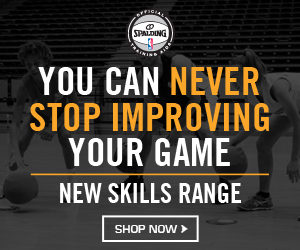
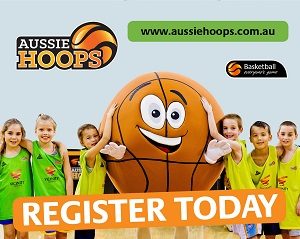
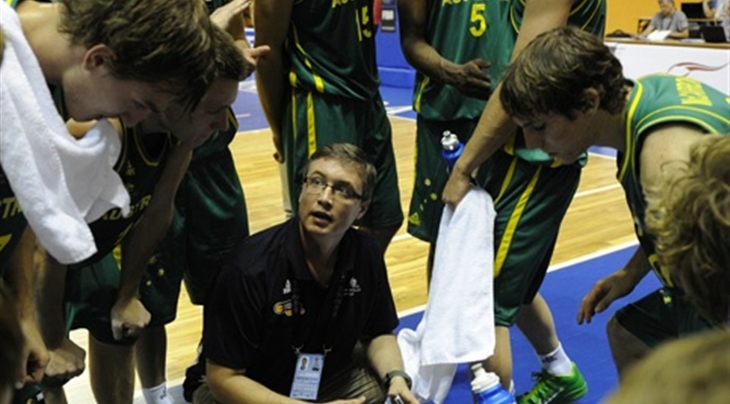

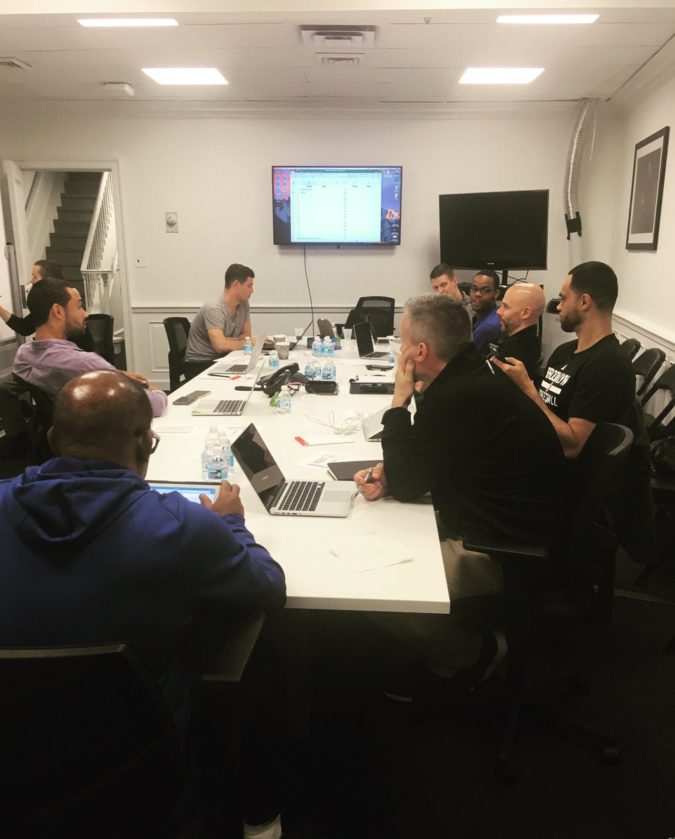
Wow Damian, straight out of my coaching Philosophy, I never accept poor techniques from any player I work with, we repeat until it is ingrained how and what is expected.